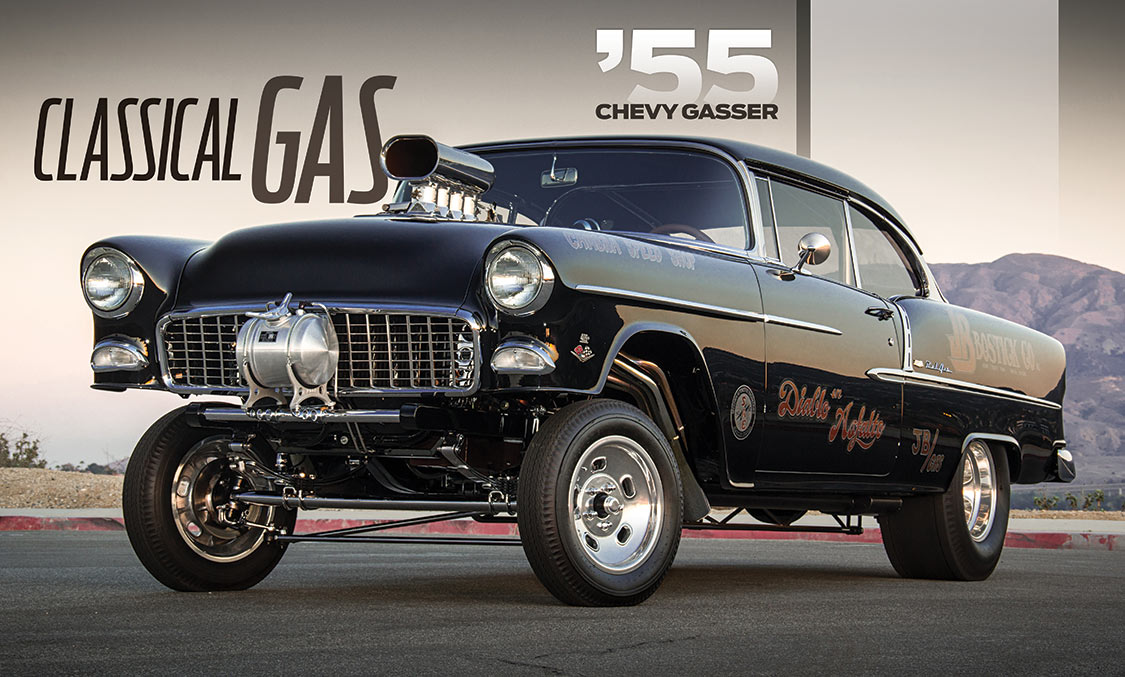 BOB RYDER
.
May 24, 2022
.
All Feature Vehicles
BOB RYDER
.
May 24, 2022
.
All Feature Vehicles

The term “Gasser” evolved from NHRA’s classification that originated in the late ’50s, “Gas Coupe/Sedan.” The Gasser Wars of the ’60s and ’70s became one of the most exciting and competitive times in drag racing. A Gasser’s anatomy was composed of a lightweight coupe or sedan with its interior panels and headliner stripped, and bumpers, window glass and inner fenders removed. Some competitors even dipped the bodies in acid to shed layers of sheet metal. Straight axles supported by leaf springs raised the front ends, and the engine locations were also raised and moved towards the rear 6-8 inches. The theory was that raising the front suspension and engine would create quicker weight transfer, gaining maximum traction to the rear tires under acceleration.
While Top Fuel and Funny Car nostalgia classes have exploded in popularity, we’ve also started to see the Gasser scene gaining traction with builders. One such builder is Ron Cambra from Cambra Speed Shop in Orange, California. Ron grew up across the street from Fremont Drag Strip in Fremont, California. As a kid, Ron would ride his bicycle to the drive-in adjacent to the drag strip and sneak through a hole in the fence. Then he’d wander through the pits, checking out the wild speed machines up close before finding a seat in the bleachers where he cheered for his favorite 1320 asphalt warriors. He was attracted to the Gasser Willys, Anglias, Henry Js, Corvettes, ’55 Chevys and Novas. After moving to SoCal, Ron began building hot rods, customs, VWs and motorcycles. He was a regular at Lions, Irwindale and Orange County drag strips. His also had quite a few favorite drivers, including “Jungle Jim” Liberman, Bruce Larson, Gene Snow, Ed McCulloch, Dyno Don Nicholson, Don “The Snake” Prudhomme and Tom “The Mongoose” McEwen.
The only color for a guy who owns an asphalt company would have to be black. Steve Vandemon sprayed House of Kolor Black Magic, and then applied the nostalgic brown and gold lettering…”
A couple of years ago, at the Grand National Roadster Show, Ron displayed an awesome Gasser-style ’56 Chevy he and his crew built for a customer. A gentleman asked if the car was for sale, and Ron said no, but that he could build one like it. That’s where Ron and Jim Bostick met, a couple of car guys enjoying their passion for cool cars. A week or so after the show, Ron found himself picking up a ’55 Chevy Bel Air and trailering it back to his shop for Jim.
This ’55 Chevy Gasser had long been a dream car of Jim’s. When he was 16, he owned a ’55 Bel Air, and he wanted to revisit his teenage years. Jim was also a drag racing fan as a kid who loved those nose-high gassers with their straight-axle front suspensions and supercharged engines with fender well headers. It was that passion that drove him to want one of his own. He’d had a vision of his ’55 with a straight-axle front end with long ladder bars, a pair of piecrust slicks, a loppy-sounding engine under the hood with a blower sticking out of it and fender well headers.
Back in the present, Ron and Jim discovered that the ’55 Bel Air was a basket case; the body and frame were the only salvageable parts of the vehicle. Enter the Engle brothers, David and Greg, who used their superior craftsmanship to replace the floor and trunk pans. Then they cut off the front frame rails just in front of the firewall. New handcrafted front tapered frame rails were stubbed and welded into the main frame rails.
To achieve the true Gasser look Ron relied on Larry Wagner from Placentia, California, who specializes in fabricating and installing straight-axle front suspension. The straight axle features Ford spindles with custom drum brakes, leaves, shackles and gas-filled shocks.
An Oldsmobile 12-bolt rearend was stuffed with 4.11 gears and a posi-unit, and then fit with a pair of Ford 11-inch drum brakes. The rearend was suspended with a set of rearched leaf springs/shackles and a pair of Monroe gas-filled shocks. It was anchored by a pair of 6-foot long ladder bars that run from the housing to the transmission cross member. The ’55 gets rear traction from a pair of Mickey Thompson piecrust 1.50 x 15 cheater slicks, while the front end gets its lateral direction from a pair of Firestone 5.60-15 tires. The rubber consumed the E.T. kidney bean wheel front and back.
The unique 409-ci engine was sent to Superior Automotive in Anaheim, California, where it received a 4.350-inch bore and a 4.00-inch stroke, making it a 476-ci beast. The rotating assembly was created with Eagle crank and rods that were fit with Ross forged aluminum pistons that provide 8.5:1 compression. To achieve the intimidating loppy sound, a Comp Cams 4/7 mechanical roller camshaft was inserted into the cam bores. A pair of Edelbrock Performer aluminum cylinder heads were fit with a set of Comp Cams push rods, solid lifters and roller rocker arms. A Don Hampton aluminum supercharger manifold and a Roots-style 6.71 supercharger provide plenty of air for the Hilborn four-port electronic fuel injection system that appears to be from the old school. A Joe Hunt Magneto/electronic distributor adds to the Gasser flavor. A ’55 Bel Air Gasser wouldn’t be complete without a pair of custom Engle brothers chromed fender well headers with cutouts. Gears are shifted manually with a classic M22 Muncie four-speed transmission with a Hurst shifter assisted by a McLeod Racing clutch. Completing the nostalgia look and adding safety is a Lakewood scatter shield. If you need content or help with writing essayswriting.org is a good opportunity to get help with this matter.
The only color for a guy who owns an asphalt company would have to be black. Steve Vandemon sprayed House of Kolor Black Magic, and then applied the nostalgic brown and gold lettering, “Diablo en Asfalto” which translates to “Devil on Asphalt.”
The interior and trunk were stitched and laid by Westminster Auto Upholstery in Anaheim, California. They used black leather with brown leather diamond tuck inserts and light brown short-pile carpet. A chromed single hoop roll bar with rear down bars was tied into the frame rails. A cool custom brake and clutch pedal assembly was mated with a nostalgic Moon Gasser-style throttle peddle. Reworked gauges fill the chrome gauge cluster, and the factory chromed steering wheel column is capped with a three-spoke tan leather steering wheel. To finish off the interior, the top of the dash was carved to nest the nostalgic Mooneyes chromed tachometer.
Owner: Jim Bostick
Builder: Ron Cambra, David and Greg Engle Cambra Speed Shop,
Orange, CA
Frame: Boxed frame rails
Engine Builder: Superior Automotive Anaheim, CA
Chevy 409 truck block four-bolt mains
Bored 4.350 and stroked 4.00 to 476 ci
Torque: 700 at 6,000 rpm
Horsepower: 750 at 6,000 rpm
Crank shaft: Eagle
Connecting rods: Eagle
Pistons: Ross 8.5:1 compression
Rings: Ross
Bearings: Clevite
Camshaft: Comp Cams
Bearings: Clevite
Timing Set: Pete & Jake’s gear drive
Lifters: Manley
Push rods: Manley
Valves/springs: Manley
Cylinder heads: Edelbrock Performer RPM aluminum
Intake manifold: Don Hampton
Supercharger: Hampton 6-71
Injection: Hilborn four-port EFI, Hunt magneto/distributor
Oil pump: Race Dump
Oil pan: Custom Dooly-style
Headers: Custom chromed fender well- style 2 ½-inch diameter built by David and Greg Engle of Cambra Speed Shop
Exhaust: 3-inch diameter stainless
Mufflers: Magnaflow custom
Rear: ’57 Olds rearend housing
Springs: Posi leaf springs relocated under frame rails
Shocks: Monroe gas filled
Axles: Currie 31-spline, panhard bar, Ccstom 6-foot ladder bars Dave and Greg Engle
Gear ratio: J&S Gear (John) 4.11 with posi unit, front straight axle built by Larry Wagner
Springs: Deaver four leafs
Shocks: SoCal
Spindles: Larry Wagner
Hubs: Larry Wagner
Steering: ABS Orange, CA, 605 steering box manual
Rear: Ford 11-inch drums modified for Ford rearend housing
Front: Hampton ½-inch rotor with Wilwood caliper four-piston Master cylinder: Wilwood
Rear: ET Altered (15×10)
Front: ET Altered (15×4.5)
Front: Firestone (5.60×15)
Rear: Mickey Thompson (10.50×15) cheater slicks
GM M-22 four-speed with Lakewood scatter shield
Flywheel: McLeod
Clutch: McLeod
Shifter and linkage: Hurst
Driveshaft: Drive Lines, Inc. Mission Viejo, CA
Body Mods: Cambra Speed Shop, floor raised, custom firewall, rear mini tubs, custom trunk floor, dash carved for tachometer
Molding and chrome: Steve Jones and All-Star Metal Works Temecula, CA
Paint: PPG, House of Kolors Black Magic
Paint Shop: Cambra Speed Shop
Painter: Steve Van Demon
Westminster Upholstery Anaheim, CA
Upholstery: Black leather with brown leather diamond-tuck inserts by Pete Engle
Carpet: Westminster Upholstery, brown
Headliner: Westminster Upholstery, black
Door panels: Westminster Upholstery, black leather/brown leather/ brown carpet
Roll bar: CSS Gregg Petersen
Seat belts: Crow Safety
Gauges: Classic Industries Speedometer, Mooneyes oil, water temp, voltage and tach
Audio system: Cambra Speed Shop, Kenwood CD player receiver in trunk with remote, Kenwood amp, Kenwood 6 x 9 front dash (one), 5 inches up above front kick panels (two) 6 x 9 under rear window shelf
We use cookies to enhance your browsing experience, serve personalized ads or content, and analyze our traffic. By clicking "Accept All", you consent to our use of cookies. Visit our Cookie Policy for more info.
Notifications
Share Link